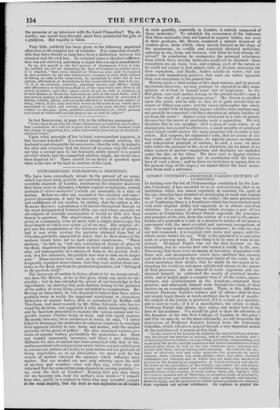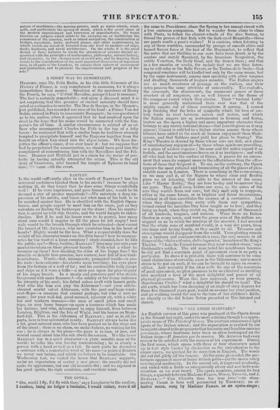LONDON UNIVERSITY—PROFESSOR PARISH'S LECTURES AT CAMBRIDGE. IN looking over the
list of Professorships established by the London University, it has occurred to us as extraordinary, that in an
institution which has aimed especially at catching the spirit of the age, there has been founded no lectureship to teach and explain
the "arts of life," as they may be called ; the more particularly as at Cambridge there is a foundation which has been worked upon with such singular ability and ingenuity as to attract universal attention. In a course of lectures which occupies a part of two seasons at Cambridge, Professor Farish expounds the principles and practice of the arts, from the cutting of a cenal to the manufacture of a penknife or a hat, in a manner to render all his hearers conversant with the mot essential and necessary occupations of life. The canal is surveyed before the audience ; its soils are dug out and examined ; it is supplied with locks and quays, until the whole .swims before the eye. With a like precision is a coal-mine sunk or a tea-cup spun. Every thing is to be seen at work in miniature. Professor Farish was not the first lecturer on the foundation, but he was the first who turned it chiefly to the arts. Perceiving that there were no means of becoming acquainted with those arts and manufactures which have enriched this country and made it celebrated to the uttermost limits of the earth, he set about mastering their" details, that he might be the organ of instructing the wealthier and more enlightened classes in the nature of their processes. He set himself to work : ingenious and mechanical himself, he cultivated the society of practical mechanists, and at length made a complete tour of all the works, manufactures, and establishments in the kingdom—mastered their practice, and afterwards himself went through the whole of their devices on an exceedingly minute scale. There is this difference between Professor Farish's lectures and all others—that he does not simply teach theory or teach anything else by word of mouth : the subject of the lecture is produced, if it is a work or a machine, and is seen to work ; if it is a manufacture, the article is made. Professor Farish digs mines, dyes calico, and makes hats in the face of his audience. We should be glad to draw the attention of the founders of the two New Colleges of London to this point ; and that we may do so the more effectually, we will transcribe the description of Professor Farisles lectures from the University Calendar, which will give a general though a very imperfect notion of the usefulness of a course of this kind.
"In the course of his lectures he explains the natural history of minerals, the theory and practice of mining, and of smelting metallic ores— of bringing them to nature—of converting, purifying, compounding, and separating the metals, and the numerous and various manufactures which depend upon them, as well as the arts which are more remotely connected with them, such as etching and engraving. He exhibits the method of obtaining coal and other minerals—the processes by which sulphur, alum, common salt, acids, alkalies, nitre, and other chemical substances, are obtained, and in which they are used—the mechanical process in the formation of gunpowder, as well as its theory and effects. He treats on the agriculture of the country, and shows the arts of procuring and working ,animal and vegetable substances ; the great staple manufactures of the country, in wool, cotton, linen, silk, together with the various chemical arts of bleaching, of preparing cloth, of printing it, of using adjective and substantive colours, and mordants and intermediates in dying, and the processes by which various products are obtained from vegetable arid animal substances, He explains in general the nature of machinery—the moving powers, such as water-wheels, windmills, and particularly the agency of steam, which is the great cause of the modern improvement and extension of manufactures. He treats likewise on subjects which relate to the carrying on, or facilitating the commerce of the country, such as inland navigation, the construction of bridges, aqueducts, locks, inclined planes, and other contrivances, by -which vessels are raised or lowered from one level to another—of ships, docks, harbours, and naval architecture. On the whole, it is the great design of thesz lectures to excite the attention of persons already acquainted with the principles of mathematics, philosophy, natural history, and chemistry, to the ;:dvancement of useful arts, and by drawing their minds to the consideration of the most important discoveries of ingenious men, in all parts of the kingdom, to enlarge their sphere of amusement and instruction, and to promote the improvement and progress of the arts."



















 Previous page
Previous page